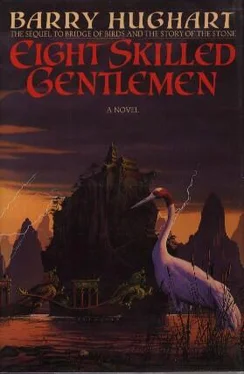Barry Hughart - Eight Skilled Gentlemen
Здесь есть возможность читать онлайн «Barry Hughart - Eight Skilled Gentlemen» весь текст электронной книги совершенно бесплатно (целиком полную версию без сокращений). В некоторых случаях можно слушать аудио, скачать через торрент в формате fb2 и присутствует краткое содержание. Город: New York, Год выпуска: 1991, ISBN: 1991, Издательство: Doubleday, Жанр: Фэнтези, на английском языке. Описание произведения, (предисловие) а так же отзывы посетителей доступны на портале библиотеки ЛибКат.
- Название:Eight Skilled Gentlemen
- Автор:
- Издательство:Doubleday
- Жанр:
- Год:1991
- Город:New York
- ISBN:0385417098; 978-0385417099
- Рейтинг книги:3 / 5. Голосов: 1
-
Избранное:Добавить в избранное
- Отзывы:
-
Ваша оценка:
- 60
- 1
- 2
- 3
- 4
- 5
Eight Skilled Gentlemen: краткое содержание, описание и аннотация
Предлагаем к чтению аннотацию, описание, краткое содержание или предисловие (зависит от того, что написал сам автор книги «Eight Skilled Gentlemen»). Если вы не нашли необходимую информацию о книге — напишите в комментариях, мы постараемся отыскать её.
Eight Skilled Gentlemen — читать онлайн бесплатно полную книгу (весь текст) целиком
Ниже представлен текст книги, разбитый по страницам. Система сохранения места последней прочитанной страницы, позволяет с удобством читать онлайн бесплатно книгу «Eight Skilled Gentlemen», без необходимости каждый раз заново искать на чём Вы остановились. Поставьте закладку, и сможете в любой момент перейти на страницу, на которой закончили чтение.
Интервал:
Закладка:
Touching the tiger got us another mandarin demanding Master Li’s head, and the water buffalo and phoenix produced boring messages about trading routes and sales figures. Then Master Li touched the brush to the dragon, and the face that filled the cage was that of the Celestial Master. From the first scathing words I realized this was the message Master Li sought, the message to Li the Cat and the Grand Warden of Goose Gate we had almost heard, but not quite.
“…Stick the turd-stained tips of your fingers into your ears and dig out the dung beetles, because I am about to demonstrate the error of your half-witted ways.”
Oh, he flayed them. He turned them inside out. Acid scoured the air as he depicted the idiocy of getting involved in some sort of smuggling racket that could lead to the Thousand Cuts, confiscation of estates, loss of rank and privilege for entire families, and the near certainty that pauperized wives and concubines and children would be led to the auction block and sold as slaves.
“If you idiots have to steal, why not steal something worthwhile?” the saint roared. “In the process you might do good despite yourselves and contribute to the restoration of morality! Listen to me, my wayward children, and I shall lead you toward the light.”
Then he led them toward the light, and I listened with disbelief, and then horror, and then despair to an agonizing degree I have seldom known. The Celestial Master was proposing to revive the ghost scheme of Confucius.
Barbarians must understand that in a civilized country the dead are immensely influential. The living are far too busy with the process of staying alive to pay attention to anything else. Human senses are in actuality “the Six Evils” because sight, hearing, touch, taste, smell, and thought are barriers against the messages of Heaven. Only the dead are free from such shackles, and when the ghost of an ancestor appears in moonlight or in dreams and bears a cryptic message it is the most important event in a family’s existence. Sometimes it’s a hugely dramatic warning: the Black Stag God is angry and you must flee the valley before influenza strikes, and sure enough ten people who stayed behind die from influenza. Sometimes it’s a great-grandmother appearing in a dream to provide the perfect protective milk name for a new baby, and speaking of babies, who doesn’t know of the ghost of a child who died at birth suddenly appearing to make an older brother jump back in fright—just before that brother’s foot was to land on a poisonous snake? The power of ghosts is awesome, and their pronouncements are unchallengeable.
Confucius knew that, and it inspired a brilliant scheme. He counseled his aristocratic clients to grind the lower classes into the mud once and for all by imposing strict ghost laws. The only ghosts recognized to be valid would be those that had the decency and civility to appear at a properly hallowed shrine in a respectable family temple, and who could afford hallowed shrines in private temples? Aristocrats, of course, and no peasants need apply. Any claim to “ancestral” lines by those without decent family estates would be greeted by lashes of the rod, a second occurrence would mean mutilation, a third would merit death. Any claim to having received a message from a family ghost by one too low to have a “family,” in the feudal Confucian sense, would be justification for being sold into slavery.
What made the ghost scheme so glorious was the fact that it was without limits. An aristocrat who coveted fertile land belonging to a commoner merely had to reveal that the ghost of his great-great-great-uncle had appeared to tell him that the land in question actually belonged to the family, and deeds to that effect would be found in the brass box in the cellar. (If need be, the ghost could reappear to explain that the deeds may have been written on paper that hadn’t been invented at the time of the supposed transaction, but that merely applied to the earth. The paper had already been invented in Heaven, and the gods had graciously presented the great-great-great-uncle with a sample.) Any legal challenge was referred to a feudal court composed of other aristocratic landowners, and as Confucius himself so charmingly put it: “The superior man is like wind, and the common man is like grass. When the wind blows, the grass bends.”
In the days of Confucius there was no empire. China was a collection of squabbling feudal states, and the single most important reason for the ghost scheme never being put to full effect once the empire was formed was Taoism. The Tao-shihs battled tooth and nail to protect the rights of the peasantry, but now the Celestial Master, leader of Taoists and the empire’s greatest living saint, was proposing that the mandarins put the profits from their illegal operation into judiciously placed bribes, and together with his immense influence and active support the ghost scheme could at last be installed throughout China. In practically no time only aristocrats would be entitled to power, property, and legal protection, with—as the Celestial Master put it—“unimaginable improvement in public morality and civility.”
I should mention that throughout this incredible speech the saint showed no signs of senility. Indeed I had never heard him so forceful and coherent, and when he finally ended his proposal and the cage went dark I turned helplessly to Master Li.
“Sir, can he have suffered some sort of a stroke?” I asked.
Rarely have I seen the old man as perturbed as he was then. He was furiously chewing the end of his scraggly beard as he thought, and then he spat it out and said, “I’ve yet to hear of a stroke that allows an arthritic centenarian to race across lawns like a Tibetan snow leopard. No, Ox, something far more dramatic than a cerebral disorder is going on, and the consequences could be almost beyond imagining.”
He had been sitting cross-legged in front of the cage. Now he jumped up and gazed at the searing brassy sky. The Yellow Wind was a huge hand lifted above the horizon; great grasping fingers reaching toward a sun that was blood red and pulsing in haze as it began to set—I hadn’t realized so much time had passed—and fine grains were whipping against branches and leaves, hissing, scraping: a giant invisible cat at a scratching post, playfully unsheathing its claws.
“Something as dramatic as a solstice that doesn’t take place?” Master Li said softly. “My boy, few disciplines are more dismal than theology, but it may be important to consider the Doctrine of Disaster, which is the Han dynasty’s chief contribution to the subject. Both the I-ching and the Huai-nan-tzu assert that natural disasters are not caused by Heaven, but allowed by Heaven. If men willfully disrupt the natural order of things, the gods will refuse to intervene while nature purges itself of the toxin, usually violently, and if the innocent suffer along with the guilty—well, the only way men learn anything is to have it smashed into their heads with an ax.”
He picked up the cage and retied it to his belt and covered it with his flowing robe.
“According to Sixth Degree Hosteler Tu, aborigines believe Envy almost caused a solstice disaster that was prevented by Eight Skilled Gentlemen,” he said slowly. “We know damn well that either Envy or an incredibly talented impersonator is still with us and up to something, and the problem with Chinese myths is that in China it’s difficult to tell where myth ends and reality begins. The August Personage of Jade will not be pleased to receive a petition to install the ghost scheme from the leader of Taoists, but that in itself shouldn’t…”
He fell silent, and then he told me to bend over and take him on my back.
“All we can do now is go down that list of involved mandarins and find the weak link. You may have to break a few of the bastard’s bones, my boy, but one way or another he’s going enable us to toss the rest of them in jail,” the sage said grimly. “Back to the city and One-Eyed Wong’s, and hurry.”
Читать дальшеИнтервал:
Закладка:
Похожие книги на «Eight Skilled Gentlemen»
Представляем Вашему вниманию похожие книги на «Eight Skilled Gentlemen» списком для выбора. Мы отобрали схожую по названию и смыслу литературу в надежде предоставить читателям больше вариантов отыскать новые, интересные, ещё непрочитанные произведения.
Обсуждение, отзывы о книге «Eight Skilled Gentlemen» и просто собственные мнения читателей. Оставьте ваши комментарии, напишите, что Вы думаете о произведении, его смысле или главных героях. Укажите что конкретно понравилось, а что нет, и почему Вы так считаете.










